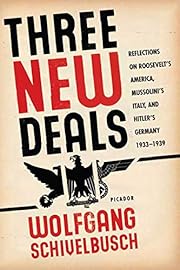

Cliquer sur une vignette pour aller sur Google Books.
|
Chargement... Three New Deals: Reflections on Roosevelt's America, Mussolini's Italy, and Hitler's Germany, 1933-1939 (édition 2007)par Wolfgang Schivelbusch (Auteur)
Information sur l'oeuvreThree New Deals: Reflections on Roosevelt's America, Mussolini's Italy, and Hitler's Germany, 1933-1939 par Wolfgang Schivelbusch
 Aucun Actuellement, il n'y a pas de discussions au sujet de ce livre. aucune critique | ajouter une critique
Appartient à la série éditoriale
Today FDR's New Deal is regarded as the democratic ideal, the positive American response to the economic crisis that propelled Germany and Italy toward Fascism. Yet in the 1930s, these regimes were hardly considered antithetical. Cultural historian Schivelbusch investigates their shared elements to offer an explanation for the popularity of Europe's totalitarian systems. Returning to the Depression, he traces the emergence of a new type of populist and paternalist state: bolstered by mass propaganda, led by a charismatic figure, and projecting stability and power. He uncovers stunning similarities: the symbolic importance of gigantic public works programs like the TVA dams and the German Autobahn, which not only put people back to work but embodied the state's authority; the seductive persuasiveness of Roosevelt's fireside chats and Mussolini's radio talks; the vogue for monumental architecture stamped on Washington, as on Berlin; and the omnipresent banners enlisting citizens as loyal followers of the state.--From publisher description. Aucune description trouvée dans une bibliothèque |
Discussion en coursAucunCouvertures populaires
 Google Books — Chargement... Google Books — Chargement...GenresClassification décimale de Melvil (CDD)973History and Geography North America United StatesClassification de la Bibliothèque du CongrèsÉvaluationMoyenne: (3.62) (3.62)
Est-ce vous ?Devenez un(e) auteur LibraryThing. |
||||||||||||||||||||||||||||||||||||||||||||||||||||||||||||||||||||||||||||||||||||||||||||||||||||||||||||||||||||||||||||||||||||||
That said, it is not a bad read, I found it an entertaining 190 pages (plus notes). (